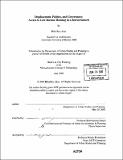| dc.contributor.advisor | Bishwapriya Sanyal. | en_US |
| dc.contributor.author | Bou Akar, Hiba | en_US |
| dc.contributor.other | Massachusetts Institute of Technology. Dept. of Urban Studies and Planning. | en_US |
| dc.coverage.spatial | a-le--- | en_US |
| dc.date.accessioned | 2006-06-19T17:31:48Z | |
| dc.date.available | 2006-06-19T17:31:48Z | |
| dc.date.copyright | 2005 | en_US |
| dc.date.issued | 2005 | en_US |
| dc.identifier.uri | http://hdl.handle.net/1721.1/33009 | |
| dc.description | Thesis (M.C.P.)--Massachusetts Institute of Technology, Dept. of Urban Studies and Planning, 2005. | en_US |
| dc.description | Includes bibliographical references (p. 109-113). | en_US |
| dc.description.abstract | Lebanon witnessed large-scale phases of internal displacement during and after its civil war (1975-1990). This study analyzes access to low-income housing for a Lebanese Shiites group which has already experienced two phases of internal displacement: from South Lebanon to Beirut during the civil war, and from Beirut to the suburbs after postwar reconstruction started in 1992. This research is a case study of Sahra Choueifat, one of Beirut's southern suburbs. It presents a comprehensive analysis of the factors that have affected the displacement and relocation processes in the second phase of displacement. The study focuses on three main issues: (i) the post-war monetary compensation to war-displaced squatters; (ii) the intervention of Shiite political parties in the housing market, and (iii) the conflict over territory in Sahra Choueifat between the incoming Shiite group and the original Druze residents. The study presents three main findings: First, the post-war monetary compensation that the evicted war-displaced squatters received was adequate to allow them to acquire legal housing in Beirut; yet the uncertainty that characterized its implementation led the families to tie-up their capital in vacant apartments before they could move. Second, political parties' intervention in the compensation phase, and in the housing market of Sahra Choueifat, secured better housing quality and tenure rights for the displaced, yet formed religious enclaves within a religiously contentious area. Third, in Sahra Choueifat, groups in opposition are using legal tools, such as zoning, voting, and manipulation of public services to define their space and exclude others. The conflict is causing the displaced families to move yet again in a third phase of displacement, from Sahra Choueifat to more Shiite-dominated suburbs. | en_US |
| dc.description.statementofresponsibility | by Hiba Bou Akar. | en_US |
| dc.format.extent | 113 p. | en_US |
| dc.format.extent | 8944330 bytes | |
| dc.format.extent | 8951000 bytes | |
| dc.format.mimetype | application/pdf | |
| dc.format.mimetype | application/pdf | |
| dc.language.iso | eng | en_US |
| dc.publisher | Massachusetts Institute of Technology | en_US |
| dc.rights | M.I.T. theses are protected by copyright. They may be viewed from this source for any purpose, but reproduction or distribution in any format is prohibited without written permission. See provided URL for inquiries about permission. | en_US |
| dc.rights.uri | http://dspace.mit.edu/handle/1721.1/7582 | |
| dc.subject | Urban Studies and Planning. | en_US |
| dc.title | Displacement, politics and governance : access to low-income housing in a Beirut suburb | en_US |
| dc.type | Thesis | en_US |
| dc.description.degree | M.C.P. | en_US |
| dc.contributor.department | Massachusetts Institute of Technology. Department of Urban Studies and Planning | |
| dc.identifier.oclc | 62081148 | en_US |
